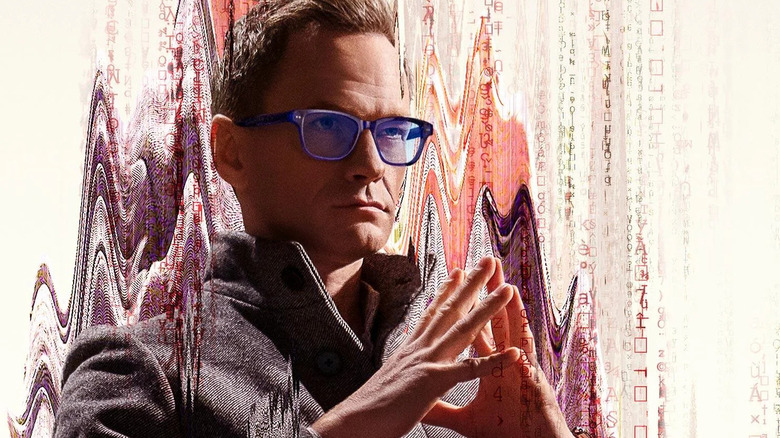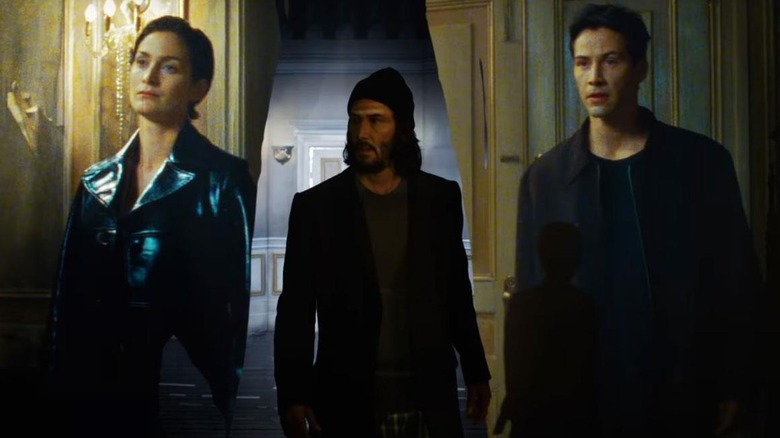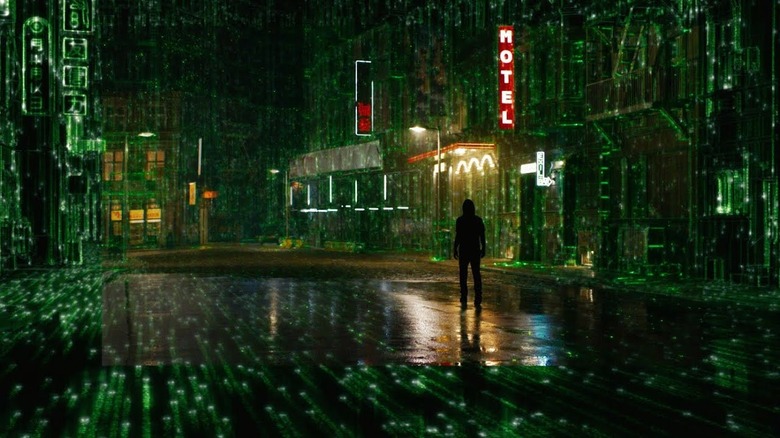The Matrix Resurrections Co-Writers Explain Its Relationship To The Original Movie [Interview]
Writing a sequel to a revolutionary film? No pressure there. In the face of sky-high expectations, co-writers Aleksandar Hemon and David Mitchell succeed with grace. With an inherent nostalgia associated with the franchise, the screenwriters don't run from it but embrace it, even question it. The past is in the present in "The Matrix Resurrections," which has a hilarious meta quality.
Hemon and Mitchell previously worked on Lilly and Lana Wachowski's Netflix series "Sense8," and Mitchell wrote the novel "Cloud Atlas," upon which the Wachowskis' 2012 film was based. The writers didn't hesitate to reunite with director and co-writer Lana Wachowski for "The Matrix Resurrections." In the beginning, Wachowski shared two foundational ideas for the film. During a phone interview, Hemon and Mitchell told us about those two ideas, the unique structure of the film, and what "The Matrix" means to them.
(Warning: minor spoilers for "The Matrix Resurrections" ahead. This interview has been lightly edited for clarity.)
"This is an operational collective joy."
The tone is very different from the past "Matrix" films. For starters, it's the funniest of the four. Was the comedy talked about from the beginning or did it just naturally happen?
David: I would go for naturally happened. I don't think we sat down and thought, 'Well, the trilogy is a bit bleak, this needs some gags.' We didn't think that at all. It just emerged from, I guess, the chemistry of our writing sessions. We are older people than Lana and Lilly were when they made the film, a lot's happened since. Our view of the world's altered somewhat, a lot's happened in the world. Good heavens, it's been a busy couple of decades, hasn't it, for human civilization? And inevitably these things bleed into the, not a nice metaphor, but they make it into your art and I guess a part of that is also involves sunlight and some humor to temper the darkness. There's a lot of that, both in the world and in the film as well. But maybe there's more of a balance for "Matrix Resurrections," which is a word, of course, that means to come back to life and in some ways to come into light more.
Alexander: I think it's largely coming from the joy that we all felt writing together, but also that aligns with the way that Lana and her crew make movies. This is an operational collective joy. It was exacerbated because there was this kind of siege thing with the pandemic when they were shooting in Germany. They were constantly together because everyone had to be vetted and tested all the time, they had to keep to one another. And so some of that joy of being together, making art at the very difficult times, it spilled into the movie clearly.
When did Lana first talk to you both about the sequel? How did she first describe it?
Alexander: Well, it was the fall of 2018 and then we got together for Christmas of 2018 and it was a rough year for Lana because her parents died. We knew her parents. I knew them very well. I lived in Chicago and so they were family. And so, she had the idea for the show and then she ran it by Keanu Reeves and then she asked us if we wanted to join, and who would say no to writing "The Matrix" with your favorite people?
David: Yes. That's the story. My memory is Lana Zooming. I was staying at my in-laws sometime in September, October 2018, was it? Yeah. And we Zoomed and I think she said, "Just say yes or no. Now just listen to me for a bit." And I did, and she sketched out one or two of the foundational ideas of the film, and I'd already decided it was a yes before the question came along, actually.
What were the two foundational ideas?
David: The notion that the trilogy becomes an artifact within the fourth film. I've seen many films I'm less than enamored by when there is, I guess, a resurrection in a sequence, and it's just one more in a row. And I loved immediately Lana's idea that this wasn't just one more in a row. It's actually a kind of a fractal case that holds and encases the trilogy. It has a trilogy inside it with the conceit of "The Matrix" trilogy existing in this rebooted Thomas Anderson's world as a trilogy of video games that he had designed 20 years ago, when in our world, "The Matrix" trilogy was playing in multiplexes all over the planet. That was just an irresistible idea for me.
Aleksandar: The other thing, it was that prominence in the dominance of love in the narrative, right? Because [Lana] lost two important people in her life, her parents ... She liked the idea of their coming back in love and that itself is kind of resurrection of love as a dominating concept ... That's the thing that I remember when she was talking about [it] ... in some ways, her love, our love, my love for her parents would be inscribed in the movie. It's a memorial.
"She's stimulated by the unpredictability."
As an audience, too, it feels cathartic seeing these characters again.
David: It does. Just when you were speaking that, if I may circle back for a moment, there's something about light as well. Lana is, obviously I can't speak for her, and she obviously prefers to step back a little bit from media work, but we have had a conversation several times where she just talks about how the nature of her relationship with light and the filmmaker has evolved down the years. And there's so much more light in the fourth film, literally. She has said how, maybe afraid of natural light is putting it too strong, but [in the past she] was daunted by the unpredictability of how natural light behaves when you're trying to make a film. Whereas now, instead of being daunted by it, she is stimulated by that chaos. She's stimulated by the unpredictability.
And some of my favorite moments [are] just flooded with beautiful natural light. It's there in the first trailer as well, where Thomas/Keanu/Neo (I don't know what to call him in these interviews) is in the bath and [the] rubber duck's on his head, and his Silicon Valley bathroom was just flooded with this beautiful golden light. It's beautiful and you wouldn't have found that in the trilogy for the above mentioned reason.
The structure of the film is very impressive. It's dense and propulsive at the same time. You see Thomas Anderson go through opening his eyes again, yet it feels different. How'd you two want to make that a different experience for him, though?
David: I'm glad this isn't a Zoom because then you would've seen me punching the air with my fists. A couple of things we wanted to get over in film clearly landed, that's great. I'll now concede the grounds to my learned colleague.
Aleksandar: [Laughs] I think what I like about the movie — and we always talked about it and it was always clear and we didn't have to talk much about it, because it was obvious, self-evident — it is that they would age Neo and Trinity. The time has passed. Time was inscribed. Another question was, so it would be 20 years later or so in the Matrix world, not just in our world. And so, then we were trying to understand what someone like Neo, Thomas Anderson, would be like 20 years later after the experience of the trilogy. What would be happening to his mind, to his consciousness, to his subconsciousness.
The idea, which is in the movie, [is] that he feels this love and cannot source it, whereas we do know where that love comes from. It was so compelling and interesting. Keanu Reeves is obviously a great star, but there's something so emotional in what he offers in this movie instead of the memory of the past, not necessarily as in a triumphant or pretending that 20 years haven't passed, but a certain amount of pain that the past always contains is always present, particularly in the early part, when he still Thomas Anderson.
David: Yeah. I like such as he said, he does fragility, and he does it really well. He's only in a couple of scenes with the Analyst. He feels this love and he's afraid that it is a symptom of schizophrenia. What would you do with that, if you actually felt it? I feel what I'm feeling but I don't know, he actually has that line, "Am I crazy?" And the analyst says, "We don't use that word in here." That's one of my favorite beats of the film.
"I'm a compulsive over-world-builder."
What idea or information was especially challenging to express on the page?
Aleksandar: Another thing that Lana mentioned earlier is the opening scene [with] a Matrix of the Matrix – [a] replica of the Matrix ... that Thomas Anderson constructs for himself, so that it could retain some of his memories, but it's unclear to him what [it means] ... He cannot get out of that loop. And so, the challenging part was ... I mean, it was all fun always, but the first part, the question was, when he doesn't know that he's in the Matrix, to what extent that would be compelling to an audience that is expecting more Matrix as soon as possible. And they get the opening scenes, but it's not quite the same thing, obviously, which is what Bug says in that scene.
And then after that, there's a good, I don't know, 20 minutes, I can't remember how long it is in the cut, but there was quite a few pages of his working in an office in San Francisco. So how to make that interesting and compelling, how not to lose the audience, [and] at the same time, how not to short change it, so it makes sense? It needed to make sense. We spent some time thinking about that and Lana spent some time thinking about it while shooting, while editing, obviously. There are many impressive things about the movie, but those solutions are most compelling.
David: That's pretty much the answer I would've launched on as well, but just been considerably less articulate. I'm a compulsive over-world-builder. I'm geeky, I'm nerdy. I want the details. I want the lore. I love all that and want as much of it as possible, but not everyone does. My wife may well feel very differently about six pages of "Matrix" lore [Laughs]. So yes, all is finding the balance.
Since it's open to interpretation, what does "The Matrix" mean to you both?
David: Oh, what does a Matrix mean? Well, it depends where you are answering this from. It means one thing to me as a kid who saw "The Matrix" in 1999. It means something else to characters in "The Matrix." If you're answering it from the history of cultural studies, it means something else. So maybe I'll go meta on your slightly meta question. "The Matrix" is a multiplicity of meanings, mic drop, there you go! Matrix is a multiplicity of meanings. Over to you. Good luck.
Aleksandar: Well, the great thing about the trilogy, and I hope this movie too, is that refracts the time in which it is made, but also imagines the future: the direction of the present that is going to catch up with us in the future. And so, it is both visionary, but also deeply ... in the present moment. And to me, the meanings are fluctuating and changing and some meanings are perhaps a little more obscure now. The phones, the ringing phones in the first "Matrix," I don't know if my children have ever seen such a phone except in the movies. And so, that meaning is gone but there were all these other things. Great works of arts reflect the time in which they are perceived, now or 20 or 30 years from now, this is why the meaning of "The Matrix" has been sustained.
There are thousands of movies that are meaningless, [or] at least hard to watch these days, because they've been overrun by time, but "The Matrix" just keeps resurrecting, to abuse the pun. So to me, much like David, I was living in Chicago at the time and I remember watching "Bound," Lana and Lilly's very movie, largely because someone in the coffee shop where I was playing chess said, "You should see this movie. They're local. They live in the neighborhood, they live in the same neighborhood." I went to see "Bound" and I loved it. And so when "The Matrix" came, I went to see "The Matrix" because I like "Bound." I don't remember any marketing campaign that I was subject to. It was total, total absolute surprise and shock. I had never seen anything like that, and I had seen a lot of movies by that time. It was obviously revolutionary and it still is 20 some years later.
"The Matrix Resurrections" is now in theaters and on HBO Max.



